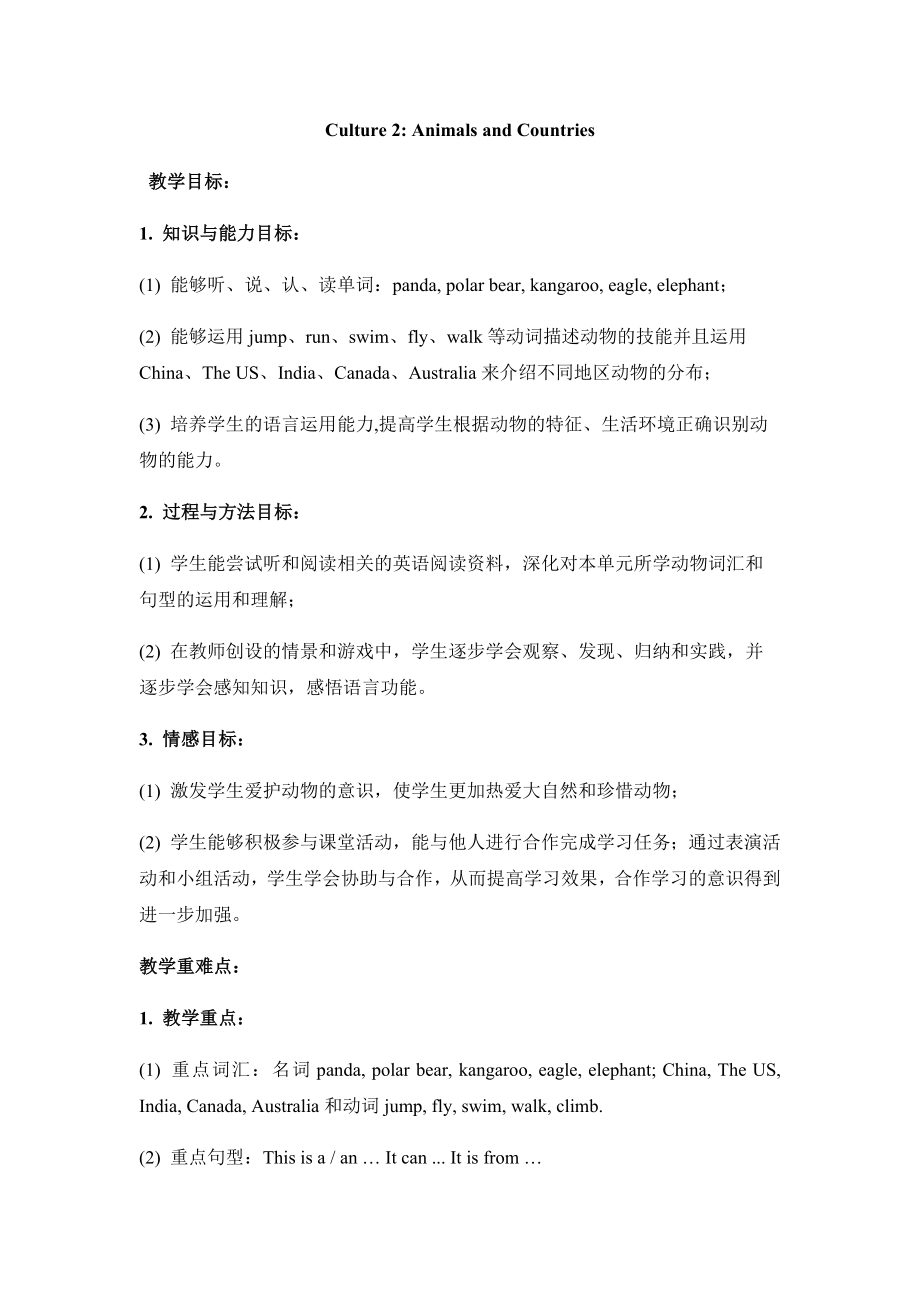《三年級上冊英語教案- Culture 2Animals and Countries 廣東開心英語》由會員分享���,可在線閱讀��,更多相關(guān)《三年級上冊英語教案- Culture 2Animals and Countries 廣東開心英語(4頁珍藏版)》請?jiān)谘b配圖網(wǎng)上搜索���。
1、Culture 2: Animals and Countries
教學(xué)目標(biāo):
1. 知識與能力目標(biāo):
(1) 能夠聽��、說、認(rèn)��、讀單詞:panda, polar bear, kangaroo, eagle, elephant�����;
(2) 能夠運(yùn)用jump�����、run����、swim、fly����、walk等動詞描述動物的技能并且運(yùn)用China�����、The US�、India、Canada�、Australia來介紹不同地區(qū)動物的分布;
(3) 培養(yǎng)學(xué)生的語言運(yùn)用能力,提高學(xué)生根據(jù)動物的特征�、生活環(huán)境正確識別動物的能力���。
2. 過程與方法目標(biāo):
(1) 學(xué)生能嘗試聽和閱讀相關(guān)的英語閱讀資料,深化對本單
2����、元所學(xué)動物詞匯和句型的運(yùn)用和理解;
(2) 在教師創(chuàng)設(shè)的情景和游戲中��,學(xué)生逐步學(xué)會觀察���、發(fā)現(xiàn)��、歸納和實(shí)踐���,并逐步學(xué)會感知知識,感悟語言功能����。
3. 情感目標(biāo):
(1) 激發(fā)學(xué)生愛護(hù)動物的意識,使學(xué)生更加熱愛大自然和珍惜動物�;
(2) 學(xué)生能夠積極參與課堂活動,能與他人進(jìn)行合作完成學(xué)習(xí)任務(wù)����;通過表演活動和小組活動�����,學(xué)生學(xué)會協(xié)助與合作���,從而提高學(xué)習(xí)效果,合作學(xué)習(xí)的意識得到進(jìn)一步加強(qiáng)����。
教學(xué)重難點(diǎn):
1. 教學(xué)重點(diǎn):
(1) 重點(diǎn)詞匯:名詞panda, polar bear, kangaroo, eagle, elephant; China, The US, India
3、, Canada, Australia和動詞jump, fly, swim, walk, climb.
(2) 重點(diǎn)句型:This is a / an … It can ... It is from …
2. 教學(xué)難點(diǎn):
(1) 句型Can it jump? Yes, it can. No, it can’t. 的正確朗讀��;
(2) kangaroo���、Australia和India的正確發(fā)音�;
(3) a / an的用法����,尤其是an eagle和elephant���。
教學(xué)過程:
Step1: Warming up
(1) Free talk.
(2) Sing a s
4���、ong Is this a dog?
(設(shè)計(jì)意圖:輕松的課前口語���,為學(xué)生營造一個愉悅的課堂氛圍;朗朗上口的歌謠與新授內(nèi)容巧妙結(jié)合����,同時(shí)激起學(xué)生學(xué)習(xí)的熱情,一舉兩得���。)
Step2: Presentation:
(1) Watch a micro-video about the animals.
(2) Ask and answer with word cards: What’s this? Is this a / an …? Yes, it is. No, it isn’t.
(3) Let’s play: When Ss see a picture, they should
5����、 say out the word quickly.
(4) Let’s guess: Have Ss look at the pictures and guess what animal it is.
(設(shè)計(jì)意圖:通過看不全猜詞游戲��,讓學(xué)生進(jìn)一步鞏固所學(xué)的動物名稱�,使課堂氣氛更加活躍,激發(fā)學(xué)生繼續(xù)學(xué)習(xí)的興趣��。)
(5) Let’s do: Look at the gif and say out what the animal can do, then do the actions.
(設(shè)計(jì)意圖:通過看動態(tài)圖和游戲I do you say. 讓學(xué)生進(jìn)一步掌握動物的基本技能���。)
6���、(6) Let’s chant: e.g: Polar, polar, it can swim.
(設(shè)計(jì)意圖:讓學(xué)生把所學(xué)的動物單詞和基本句型變成簡單的歌謠����,讓學(xué)生都有機(jī)會動一動�����,唱一唱�,學(xué)生的學(xué)習(xí)熱情得到很好的延續(xù)。)
(7) Watch a micro-video about the countries.
(8) Let’s guess.
(9) Choose the right countries according to the flags.
(設(shè)計(jì)意圖:通過對國旗的描述讓學(xué)生來猜國家和看國旗選擇國家的互動���,進(jìn)一步鞏固學(xué)生對所學(xué)國家國旗的掌握�����。)
(10) Look
7�、at the map of the world and find out the countries.
(設(shè)計(jì)意圖:通過查找國家在地圖上相應(yīng)的位置�,對學(xué)生知識面進(jìn)行拓展。) Step3: Practice:
(1) Let’s practice: Look at Have students choose one animal they like and then use the following sentences to talk about it in groups.
A: Hello. This is a panda.
B: Where is it from?
A:
8�、It is from China.
(設(shè)計(jì)意圖:通過老師和學(xué)生的示范讓學(xué)生進(jìn)行小組合作,介紹來自各個國家的動物名稱以及他們的基本技能����,讓每個學(xué)生都有機(jī)會展示自我��,從而達(dá)到運(yùn)用英語的效果。)
(2) Choose, write and match.
(設(shè)計(jì)意圖:通過筆頭練習(xí)����,檢查學(xué)生對所學(xué)知識的掌握,達(dá)到了輸出的作用��。)
Step4: Emotional Education:Animals are our friends. We should love and protect them.
(設(shè)計(jì)意圖:通過用英語表達(dá)出相應(yīng)動物,鞏固舊知識學(xué)習(xí)新知識���,培養(yǎng)學(xué)生熱愛動物、保護(hù)動物的意識��。)
Step5: Talk about your favorite animals in the other countries with your parents or friends.
Step6: Blackboard writing:
 三年級上冊英語教案- Culture 2Animals and Countries 廣東開心英語
三年級上冊英語教案- Culture 2Animals and Countries 廣東開心英語

